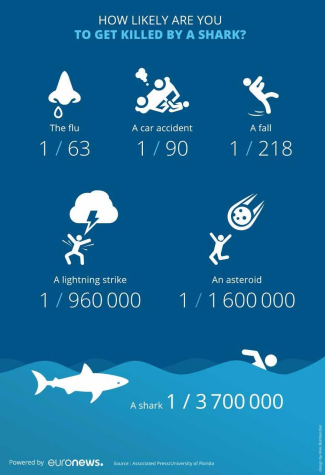The Innocent Enemy and the Twisted Hero
How Sharks Are Innocent of Their Perceived Crimes and How Humans are the Real Villains
April 8, 2022
Out of all the animals on Earth, not many are feared more than sharks. These large predatory fish have a bad reputation administered in the last 50 years with many considering them man-eaters or rogue killing machines, but in reality, that could not be further from the truth. In fact, the real monsters in this story of man vs. shark are us, the humans, but why do we fear them so much? The answers may shock you.
Sharks are innocent creatures that are just trying to survive, but we perceive them as murderers. Shark attacks, as they have been consistently called, are very rare. These attacks which caused sharks’ terrifying status only have a 1 in 3.7 million chance of occurring. To put this into perspective, the likelihood of a human being killed by man’s best friend, dogs, is around 1 in 280,000, a little over 13 times more likely. Not only that, but only around 5% of all shark species attack humans.
We as humans single sharks out, imagining a more dangerous creature than they actually are, and to put some salt into the wound, the overwhelming majority of shark attacks are by accident on the sharks part. The shark is not as smart as the human, so we should not judge their decision-making like that of a human, because a shark’s intelligence or the vision quality of the ocean might impair their decisions. In fact, according to a 2015 study in the Australian Medical Journal, sharks, specifically great whites, dislike the taste of humans compared to their prey like seals because we have lower fat and less protein
These statistics beg an important question: Why do we fear sharks so much? They are not particularly aggressive, do not live in the domain of humans (land), and the majority of attacks are accidental. To answer this question, we must look at the movie that caused every person in the 1970s to say they were afraid to go in the water: “Jaws.” “Jaws” is one of the most famous, and important movies of all time and involves the journey of three men embarking on a mission to kill a murderous great white shark. It is very loosely based on the 1916 New Jersey Shark Attacks. “Jaws” was the first-ever summer blockbuster and paved the way for movies to come, but besides that aspect of the film, the depiction of Bruce (the great white shark) is paramount.
“Jaws” sends a clear message about the animal, and that message is shown in Quint’s speech about his rescue from the Indianapolis, a real-life tale about the American cruiser, the USS Indianapolis, which was sunk by a Japanese submarine during WWII and had around 12 to 150 of the 1,196 men who survived the sinking die from shark attacks. “Sometimes that shark looks right at ya. Right into your eyes. And the thing about a shark is he’s got lifeless eyes. Black eyes. Like a doll’s eyes. When he comes at ya, he doesn’t even seem to be livin’ ’til he bites ya, and those black eyes roll over white and then you hear that terrible high-pitched screamin’. The ocean turns red, and despite all your poundin’ and your hollerin’ those sharks come in and they rip you to pieces,” this is what Quint says about the sharks and this is what motivates him to become a shark hunter.
The audience of “Jaws” blindly follows Quint’s views about sharks as the movie paints the animals as killing machines, without thought or feelings, like dolls, and as a result, a generation of people become terrified and hostile toward sharks.
The media ate up the stories of “Jaws” and turned against the animals and even government administrations determined that sharks were fish that served no purpose and that they should be eradicated. Sharks were considered to be able to go “rogue” and just start killing humans for the sake of killing which meant that sharks, especially great whites, bull sharks, and tiger sharks became the prime target for angry humans. As a result, we began to hunt them because they were seen as a threat. That would be like someone killing a young Adolf Hitler because he would eventually become a monster, but unlike that moral question, we didn’t care about the shark’s life like we would care about a human’s and we killed them anyway. Most self-proclaimed shark hunters, at least in the 30 years after “Jaws” released, didn’t kill for food; instead, they killed for the sake of killing. Most of the time we killed them, strung them up, and just left them there for a good photo op and to show that man could overcome nature. This practice became known as shark culling and is still around to this day in places like Australia which was just killing the sharks because they might pose a threat to humans in the future.
It took 33 years after the release of “Jaws” for congress to pass a shark conservation act but by then the damage had already been done as many sharks including the great white are now close to extinction or endangered. This has led to many shark writers and hunters, such as the author of the famous book that inspired “Jaws” with the same name, Peter Benchley, regretted writing their books and hunting the creatures. “What I now know, which wasn’t known when I wrote Jaws, is that there is no such thing as a rogue shark which develops a taste for human flesh… No one appreciates how vulnerable they are to destruction” is what Benchley answered when asked about his thoughts about writing “Jaws” and what he thought about sharks as a whole
In reality, sharks are much more gentle creatures than many will have you believe. In fact, even the most aggressive of these creatures, like the great white, won’t often attack if it knows what you are. Sharks just want to be left alone most of the time as they are just trying to swim and hunt for other, easier to eat, food. The shark species that is actually the biggest “threat” to modern humans are cookiecutter sharks, which are some of the smallest sharks out there, but were known for attacking and disrupting submarines of major navies like the US Navy in the 70s.
Will sharks recover from their status as man-eaters and become better because of it? Probably not, as even today sharks are being portrayed as villains in the media and in pop culture at large. Will sharks continue to kill humans? Definitely, when a carnivorous animal is hungry no matter the animal, it will eat humans to sustain itself. Are Sharks innocent of their killing of humans? Mostly, though some attacks are deliberate without any factors affecting their decision making most are not. However, the question most important for this discussion is are we the villains in this relationship between man and shark? Does the killing of 10 justify the killing of 100 million? Do you side with the Innocent Enemy or the Twisted Hero?





